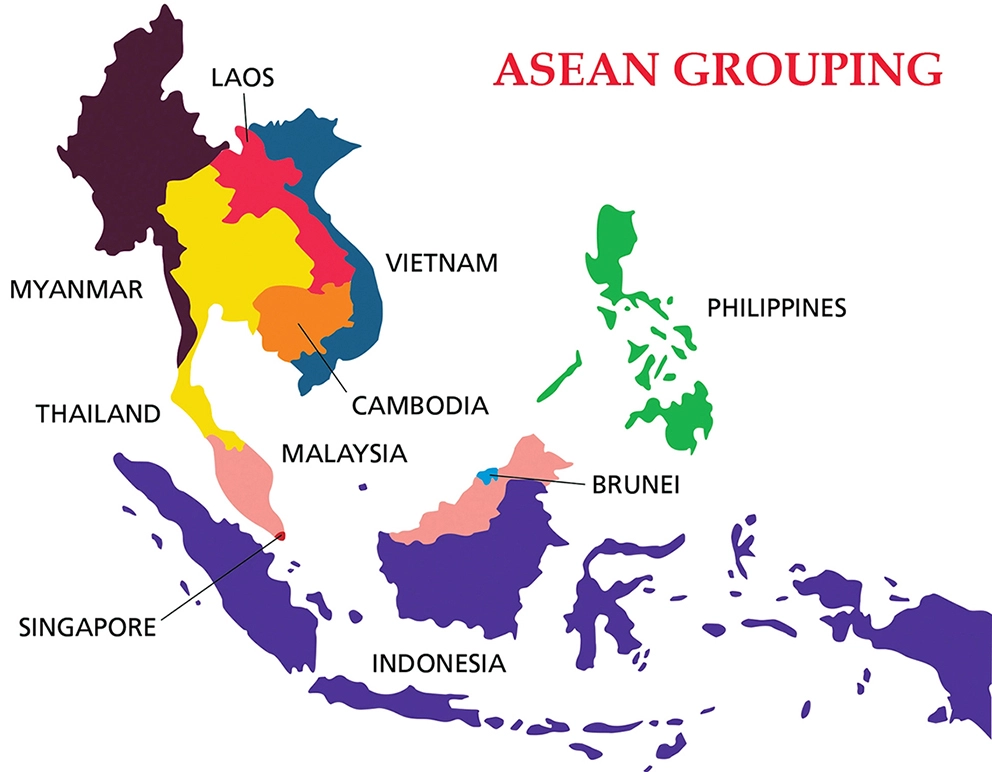International Relations
20th ASEAN-India Economic Ministers’ Meeting
- 25 Aug 2023
- 6 min read
For Prelims: 20th ASEAN-India Economic Ministers’ Meeting, ASEAN-India Comprehensive Strategic Partnership, Pandemic, Supply Chains, Food Security, Free Trade Agreement.
For Mains: 20th ASEAN-India Economic Ministers’ Meeting, India-ASEAN Relations.
Why in News?
Recently, the 20th ASEAN-India Economic Ministers’ meeting was held in Semarang, Indonesia, marking a significant step in enhancing economic cooperation between India and the ASEAN member countries.
What are the Key Highlights of the Meeting?
- Strengthening Economic Partnership:
- The meeting underscored the shared commitment to fortify the ASEAN-India Comprehensive Strategic Partnership, ensuring substantial benefits for both sides.
- The ministers highlighted the importance of fostering economic collaboration amid the challenges posed by the Pandemic.
- The bilateral trade between India and ASEAN in 2022-23 amounted to USD 131.5 billion, constituting 11.3% of India's global trade for the same period.
- ASEAN-India Business Council (AIBC):
- The ministers acknowledged AIBC's endeavors throughout 2023, including the 5th ASEAN-India Business Summit held in Kuala Lumpur in March, 2023.
- AIBC is an organization formed by the Governments of ASEAN and India in 2005 with the aim to foster closer business linkages and provide an industry perspective to the broadening and deepening of economic linkages between ASEAN and India.
- Recognition was given to the concerns raised by businesses regarding Non-Tariff Barriers (NTBs), highlighting the growing exchanges and interactions among stakeholders from both sides.
- NTB refers to any obstacle or restriction that hinders international trade but does not involve the imposition of a direct tariff or customs duty on imported goods. Some examples of NTB are General or product-specific quotas, Quality conditions imposed by the importing country on the exporting countries, Unjustified Sanitary and Phyto-sanitary conditions etc.
- The ministers acknowledged AIBC's endeavors throughout 2023, including the 5th ASEAN-India Business Summit held in Kuala Lumpur in March, 2023.
- Addressing Regional and Global Challenges:
- Amidst the intricate landscape of regional and global challenges, the ministers engaged in discussions about the multi-dimensional effects of the Covid-19 pandemic, climate change, financial market volatility, inflation, and geopolitical tensions.
- Key areas for cooperation were identified, such as robust Supply Chains, Food Security, energy security, health, and financial stability.
- AITIGA Review - A Key Agenda:
- A pivotal point of this year's meeting was the thorough review of the ASEAN-India Trade in Goods Agreement (AITIGA), originally signed in 2009.
- The discussions were preceded by a meeting of the AITIGA Joint Committee, which deliberated on the review's roadmap.
- The Term of Reference and Work Plan for AITIGA Review Negotiations were finalized during this process.
- Endorsement and Commencement of Review:
- The ministers officially endorsed the review documents for AITIGA, paving the way for the formal commencement of negotiations with predefined modalities.
- The initiation of the AITIGA review addresses a longstanding demand from Indian businesses and promises to make the Free Trade Agreement (FTA) more conducive to trade and mutually beneficial.
- A quarterly schedule of negotiations was agreed upon, with the aim of concluding the AITIGA review by 2025.
- This review process is anticipated to bring about enhancements in trade diversification while also addressing existing trade imbalances.
What is the Association of Southeast Asian Nations (ASEAN)?
- About:
- It is a regional grouping that promotes economic, political, and security cooperation.
- It was established in August 1967 in Bangkok, Thailand with the signing of the ASEAN Declaration (Bangkok Declaration) by the founding members of ASEAN, namely Indonesia, Malaysia, Philippines, Singapore and Thailand.
- Its chairmanship rotates annually, based on the alphabetical order of the English names of Member States.
- ASEAN countries have an estimated 666.19 million people and a combined Gross Domestic Product (GDP) of USD USD 3.2 Trillion.
- Commodity trade between India and ASEAN region has reached 98.39 billion in the period April 2021- February 2022. India’s main trading ties are with Indonesia, Singapore, Malaysia, Vietnam and Thailand.
- Members:
- ASEAN brings together ten Southeast Asian states – Brunei, Cambodia, Indonesia, Laos, Malaysia, Myanmar, the Philippines, Singapore, Thailand and Vietnam – into one organisation.
UPSC Civil Services Examination, Previous year Question (PYQ)
Prelims
Q1. Consider the following countries: (2018)
- Australia
- Canada
- China
- India
- Japan
- USA
Which of the above are among the ‘free-trade partners’ of ASEAN?
(a) 1, 2, 4 and 5
(b) 3, 4, 5 and 6
(c) 1, 3, 4 and 5
(d) 2, 3, 4 and 6
Ans: (c)
Q2. The term ‘Regional Comprehensive Economic Partnership’ often appears in the news in the context of the affairs of a group of countries known as (2016)
(a) G20
(b) ASEAN
(c) SCO
(d) SAARC
Ans: (b)
Mains
Q. Evaluate the economic and strategic dimensions of India’s Look East Policy in the context of the post-Cold War international scenario. (2016)





